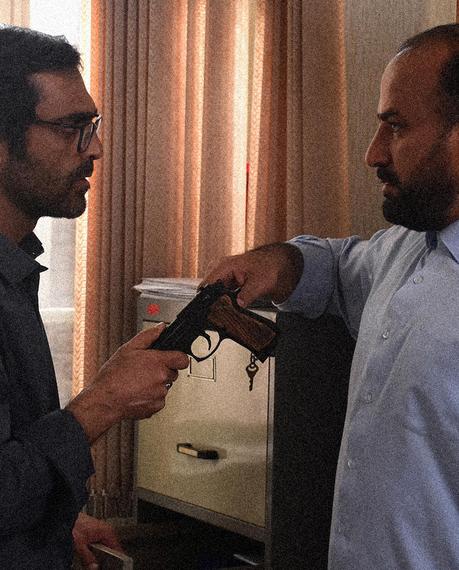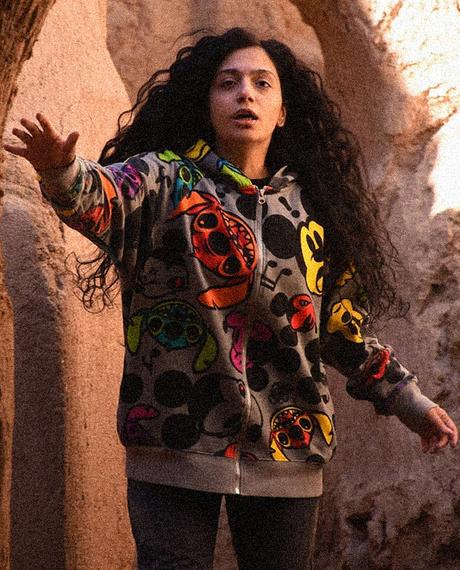Most synopses of Mohammad Rasoulof‘s The Seed of the Sacred Fig highlight it as a story about a family torn apart by a lost gun. The film builds toward that point patiently (if not too meanderingly) but intentionally. The first few minutes frame it as an undeniable MacGuffin—detailing how the film’s main character, Iman (Missagh Zareh), acquires the gun as part of a new responsibility and guarantee for his position as a state investigating judge. To my surprise, the firearm doesn’t disappear until the film reaches the hour mark.
Instead of focusing on the gun, the film examines the people connected to it and the circumstances that complicate their lives. In the process, the plot plunges headfirst into Tehran circa 2022—during the ‘Women, Life, Freedom’ movements that saw protestors persecuted by the theocratic Iranian government. Rasoulof cleverly juxtaposes Iman’s story and the women in his life with the broader struggle of the country’s brave women and their constant persecution by the regime. It operates on both macro and micro levels, at the cost of a bloated but necessary duration. Yet, the film speaks for itself—full of wrath and resilience, the same qualities that got the director banned in his own country.
Women, Life, Freedom
When the story begins, Iman receives a promotion he’s been working toward for a long time, but it comes with a cost—his faith. He’s tasked with investigating the state’s enemies and signing off on death penalties—something his predecessor was unable to do. This newfound responsibility will grant him a prosperous life: a larger apartment in a safer neighborhood and a higher income to provide his upper-middle-class family with an even better living. However, it comes with a steep consequence: his work and personal life must never intersect for his security, hence the gun—given to him for protection.

Iman’s wife, Najmeh (Soheila Golestani), takes this as a cue to warn their daughters—the opinionated college student Rezvan (Mahsa Rostani) and the curious teenager Sana (Setareh Maleki). The daughters must stay away from social media and conform to the state’s terms (i.e., mind how they behave, dress, and who they associate with) to avoid drawing unnecessary attention that could jeopardize their father’s career. All of this unfolds amid nationwide political protests descending into chaos.
This is where Rasoulof’s juxtaposition becomes effective. The Jina Revolution, a turning point in Iranian women’s fight for freedom, intensifies. Women, previously subjected to strict rules about behavior and dress, take to the streets, chanting “women, life, freedom” in Farsi—screaming their anger and longing for liberty. The theocratic government sees this as a threat, labeling these women “immoral” and inciting violence against protestors, regardless of gender or age.
The plot thickens almost immediately when the daughters’ friend, a feminist named Sadaf (Niousha Akhshi), gets caught up in the violence with no one else to turn to. The rift within the household becomes more apparent. The daughters—like other younger women in the country—stand up and show solidarity with Sadaf. Meanwhile, the mother—almost representing the older female generation—sees it as an act of defiance. Yet, The Seed of the Sacred Fig doesn’t make the struggle one-dimensional. Najmeh harbors the seed of solidarity in her heart but remains confined by her devotion to her husband and the vision of a comfortable life. She argues that Iman doesn’t need to know about these ordeals; therefore, she struggles alone to protect both sides from each other.
At this point in the story, the gun has quietly dropped into the background. There’s no sign of its presence, but it remains a Chekhov’s Gun waiting to be fired. However, it hasn’t vanished—like an impending doom. Rasoulof makes it clear that this is not a story about a lost gun but rather a story about women—their lives and their freedom. The gun remains a mere symbol of both protection and destruction—just like the government’s forces behind the persecution of women. We know what it is, but we keep it at bay—just as the filmmaker does for its sensitive nature.
The Politics of Walking on Eggshells
There have been, and always will be, polemics arguing that politics operate at higher levels. This feels real and suffocating, just like the titular fig, though some might argue it’s not relatable on a personal level. The Seed of the Sacred Fig, for all its gut-wrenching depictions, serves as a catalyst for such a discourse—and the film takes its stance.

The macro and micro juxtaposition delivers a direct rebuke to those who believe politics don’t affect individuals. The film frames oppression in a domestic setting, with Iman immediately turning into a surrogate for the Iranian regime. Once the gun slips out of the story, Iman (whose name means ‘faith’) begins losing faith in everyone around him. He starts walking on eggshells of his own making, drowning in paranoia and seeing everyone as an enemy—just as the government does. He grows increasingly aggressive and controlling; at one point, he sends his family to a state interrogator to extract answers. He even forces his family to confess on camera, mirroring what the Iranian regime does to its alleged enemies.
The second half of the film builds on the prolonged setup, morphing into an unrelenting force that keeps this political thriller taut and paranoia-inducing. A sense of lurking danger permeates every scene, working on two levels: for Iman, it’s the fear of facing dire consequences for blindly following the government’s oppressive nature, pushing him to the brink of losing his family. For the women, danger is omnipresent—both inside and outside the home.
The third act veers into something unexpectedly different, almost detached from the preceding atmosphere. Yet, it showcases Rasoulof‘s craftsmanship in creating tension that feels visceral and immersive. There’s a car chase, a cabin kidnapping, a cat-and-mouse thriller, and even a final-girl trope. It feels like the film dives into a hypothetical realm—the worst-case scenario if the government takes complete control of your life.
The Seed of the Sacred Fig is suffocating, and it shows. When the director ultimately flees his country, it underscores just how vocal this film is in its stance. It’s being honest in dissecting how oppressive, chauvinistic govt tears everyone apart — from society to families; giving an in-your-face smack to those who believe politics isn’t personal.
